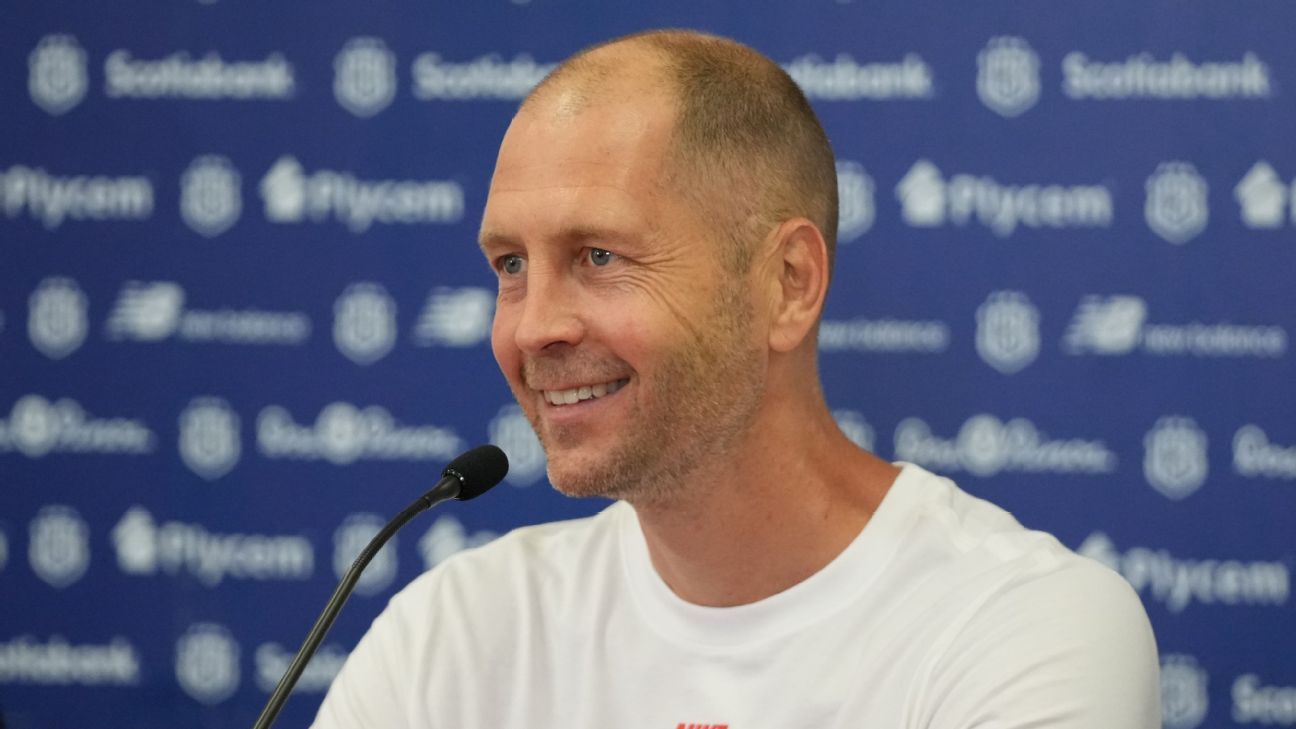United States men’s national team manager Gregg Berhalter is shifting his focus to the team’s preparation for the World Cup after securing qualification, adding that his initial goal is to get out of the team’s group, regardless of how Friday’s draw plays out.
“The starting point is getting out of the group and once you do that, it’s tournament time,” he said. “It’s not single elimination, so anything can happen.”
– ESPN+ viewers’ guide: LaLiga, Bundesliga, MLS, FA Cup, more
– Don’t have ESPN? Get instant access
The U.S. lost 2-0 to Costa Rica in its final qualifier, but knew going in that all it had to do was avoid losing by six goals to the Ticos in order to clinch qualification. The U.S. finished third in CONCACAF qualifying, level on points with the Ticos, but took the final automatic qualification spot due to its superior goal difference.
The qualification effort was full of ups and downs, and the team had to contend with the specter of the failed qualification effort over four years ago. Berhalter credited the players and staff for successfully navigating their way through the 14-game campaign.
“Going through it, the expectation is that we win every game, and so there’s a disconnect, I think, between expectations and reality,” Berhalter said on a Zoom call with reporters, prior to flying to Qatar for Friday’s draw. “And I think that that builds pressure on the team a little bit. But then the second thing is we really felt the public was behind us in this, and it was a great feeling. So particularly the home games when the stadiums were electric and creating an amazing atmosphere.
“But in the same sense, there was also this feeling that the public was on edge and they desperately wanted us to make it. We desperately wanted to make the World Cup, and I think overall it’s just a great lesson for everyone that you can’t take qualifying for granted. It’s about what you do on that day, and it’s about staying one game at a time.”
Berhalter, who as a player was part of the U.S. teams that went to the 2002 and 2006 World Cups, added that the conditions and atmosphere at the World Cup could suit his players better than the wide range of environments the team faces in CONCACAF.
“The games are a lot more controlled. I think that the atmospheres are a lot more controlled. The field conditions are standardized,” he said about World Cup matches. “So it’s a lot more predictable, in a sense, but the level is better. I think our guys can adapt to that easier. I think that will be something where our guys are used to playing with top players in the world, and this will be another opportunity for them to do so.”
Once Friday’s draw is completed, Berhalter will be aiming to maximize his time with the team. The U.S. will have four matches in the CONCACAF Nations League in June, with another two matches in the September window. Berhalter said he hopes the latter two matches will be against teams in confederations that the U.S. hasn’t played much recently, such as Africa and Asia. The USSF is looking at games against South American and European opponents as well, though there is room for only two matches.
For Berhalter, it’s still not enough time, given the awkward timing of the tournament starting in November.
“It’s less than ideal preparation, in terms of the time we’re going to have. But every team is going to be doing the same thing, so we’ll be able to deal with it, just like everybody else,” he said.
Berhalter added there are still some parts of the field, such as left-back, where he would like to increase the team’s depth. There is also the ongoing competition to see who will take hold of the No. 9 role.
“[I’m] hoping that the No. 9 gets in good form and continues to push whether that’s Ricardo [Pepi] or Daryl [Dike] or Gyasi [Zardes], or Jordan [Morris]or Jesus [Ferreira], wherever that may be, or Josh Sergeant even. We’re hoping that one of our nines gets into good form by the time the World Cup comes around.”
Berhalter also made it clear that his goals go beyond getting out of the group.
“I didn’t want to paint it as we have low expectations because. That’s not the case at all,” he said. “But you see the time and time again, top teams not getting out of their group. So it has to be a priority for any team to get out of your group and go from there, see where you play next, prepare to beat that team. And that’s where it becomes fun.”
